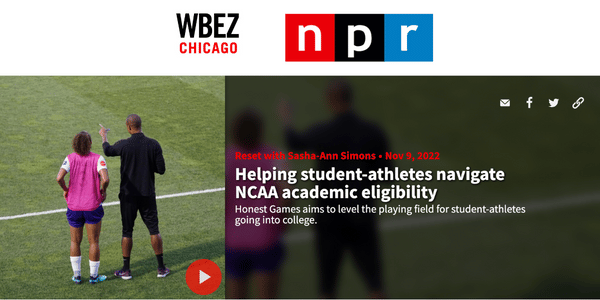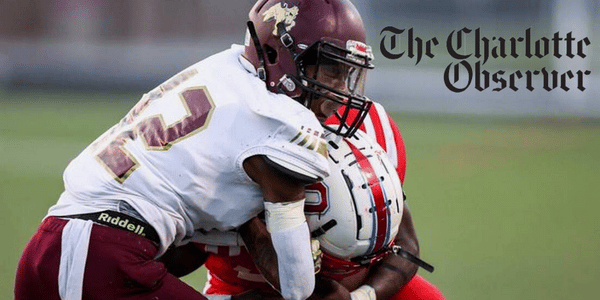Honest Game Eligibility Checklist for College-Bound Student-Athletes
Updated on Jul 8, 2025

While you may not have your college goals mapped out yet, starting the academic and recruiting process as early as freshman year in high school is key to not missing out on future opportunities.
Honest Game’s Checklist for College-Bound Student-Athletes highlights the key steps to getting recruited and ensuring you’re on the path to academic full-qualifier status to practice, compete, and earn a scholarship for college sports.
Freshman Year
- Confirm Course Registration – You will need to confirm that you are registered for at least 4 units (8 semesters) of NCAA-approved core courses at your school.
- NCAA-approved subject areas that should be taken freshman year include English and Math, Social Science, Natural Science, and/or World Language usually fulfill the other requirements.
- If you are registered for fewer than 4 NCAA-approved core courses freshman year, plan for summer school to ensure you don’t fall behind.
- Review the Rules – Read through the NCAA’s College-Bound Student-Athlete Guide and Honest Game’s Academic Eligibility 101 Guide for a summary of the ins and outs of the requirements for competing in college sports.
- Know Your NCAA Core GPA – At the end of each term, check your Honest Game report for your updated NCAA Core GPA or calculate your NCAA Core GPA yourself. If your NCAA Core GPA is below 2.4, meet with your school counselor to set a goal for the future. Learn more about Honest Game’s CARE® (College Athletic Report on Eligibility) and how it provides you with short-term, achievable goals to support the academics you need to play college sports.
- For Mid-Year Transfers – For any transfer students, check your Honest Game CARE® report to confirm your transfer school courses will count towards your NCAA Core Credit requirements. You can also do this on your own by using the previous school transcript and CEEB code to cross-check the course names.
- Plan for Summer School if Necessary – Once your grades are in, make a plan to take NCAA-approved summer school courses if any of the following are true:
- Have an NCAA Core GPA below a 2.3
- Did not complete 4 units (8 semesters) of NCAA-approved Core Courses freshman year
- If your school does not offer NCAA-approved courses in the summer, students may take NCAA-approved courses with a virtual school. The virtual courses need not count toward your school’s graduation credits, however, the virtual school transcript must be submitted separately to the NCAA Eligibility Center.
Sophomore Year
- Ensure Freshman Class Items are Completed.
- Register with the NCAA and NAIA Eligibility Centers – Beginning sophomore year, you should register with the NCAA Eligibility Center and/or NAIA Eligibility Center if you are considering playing sports at the DI, DII, or NAIA levels.
- Fee waivers are available as is an initial free NCAA Student Profile account. If you are unsure if you qualify for a fee waiver, contact your school counselor.
- You need your NCAA ID # and completed NCAA Eligibility Center registration in order to take official visits, which start junior year.
- Retake NCAA Core Courses if Necessary – If your NCAA Core GPA falls below a 2.3 for DI and 2.2 for DII, you should follow up with your school counselor to plan to take additional courses in order to give your GPA a necessary boost.
- Make a Potential College List – Divide a starter list of colleges into two lists including (1) a list of schools where there is a possibility of competing at the varsity level, and (2) a list of schools where athletics are unlikely but the college or school still appeals to you. Start with these considerations:
- Prioritize college academic fit, location, campus, size, diversity, and field of study
- You should have approximately 10 safety, 10 best fit, and 10 reach schools (for academics)
- You should then research each team’s athletic roster to examine things like athlete height and weight at your position, high school bios of team members, and recruiting videos on YouTube. This will help you realistically compare your skills and abilities with current players.
- This is a trial and error process – your list will get bigger than smaller as you execute this trial and error process.
- Submit Online Questionnaires – Once the starter list of schools has been created, fill out online questionnaires on college team sites. Use social media to follow college coaches and direct message them.
- Contact College Coaches – After submitting online questionnaires, email college coaches directly. Just as you would send game highlights, you should be putting your best foot forward to highlight your academic achievements. Learn more about how to leverage your academics when communicating with college coaches. There are no limitations to coaches watching or talking to students for NCAA DIII, NAIA, or junior colleges, the NCAA DI and DII generally prohibit live scouting until after sophomore year. See the NCAA’s sport-specific recruiting calendars.
- For those considering “re-classifying”, now is the time to think through the process and decide if you are going to repeat an entire year. But before you decide to reclass, it is necessary to ensure you maintain your NCAA eligibility status upon graduation.
Junior Year
- Ensure Sophomore Class Items are Completed.
- Complete NCAA 10/7 Requirement – For NCAA DI eligibility, ensure you complete the NCAA 10/7 requirement and lock in the best grades – the summer before senior year is your last chance to meet this requirement. Honest Game has simplified the complexities of the NCAA 10/7 Rule, make sure to read and review for important tips on the NCAA requirement.
- Re-Evaluate College List – Evolving academic, athletic, student priorities, and interest from coaches will affect college lists.
- Schedule Campus Visits – If you are interacting with college coaches ask for campus visits. If you are not hearing back, you may be aiming at the wrong division and need to adjust your list of potential colleges. Read Honest Game’s blog on college recruiting visits to learn what you need to do before, during, and after your campus visits.
- Verbal Commitments – Verbal commitments can happen at any time, but junior year is a common time for those to happen. Remember that verbal offers can be taken away and are non-binding. It’s important to keep up your grades, and athletic performance and exhibit positive behavior.
- Confirm Transcript Has Been Submitted – Be sure to confirm with your school counselor that your official transcript (and fee waiver if applicable) has been submitted to the NCAA Eligibility Center after the end of junior year.
- Ask for Teacher Recommendation Letters.
Senior Year
- Ensure Junior Class Items are Completed.
- Complete College Applications (as early as August 1st).
- Apply for Financial Aid/Complete FAFSA Forms (traditionally October 1st) – Even if you don’t think you’ll qualify for federal aid, you should still apply. Learn why every student should fill out the FAFSA form.
- Spring Semester Grades Count – Remember that coursework from your senior spring semester counts and high school graduation is still necessary (even if deemed an NCAA Early Qualifier).
- Consider Virtual Courses – If you find yourself falling short of credits for NCAA eligibility, consider taking virtual courses during your senior year or the summer after graduation.
- Sign Athletic Grant-in-Aid – For those students signing an athletic grant-in-aid, make sure to return the completed form to the college and keep a copy for your records.
- Request NCAA Amateurism Certification – Seniors must complete the NCAA Amateurism Certification questions. To receive an amateurism certification, as a prospective student-athlete you should:
- Register with the NCAA Eligibility Center.
- Completely and accurately fill out the “Sports Participation” section during registration.
- Request final amateurism certification (PDF) promptly.
- Monitor tasks assigned to your account.
- Considering graduating early? Check the NCAA Requirements First – If you are considering graduating early, you must still complete your NCAA DI/DII requirements.
- Confirm School Decision – College Admissions National Decision Day is usually May 1st and most college choices need to be made by that time.
- Pay Tuition Deposit – Students must pay their college deposit by deadlines. Full scholarship student-athletes may not need to pay admissions deposits – make sure to ask your college coach.
- Confirm Final Transcript Has Been Submitted – Confirm with your high school counselor that your final transcript with proof of graduation has been submitted to the NCAA or NAIA Eligibility Centers.
Download and print the checklist to keep yourself on track with academic eligibility and recruiting for college sports. The pathway to college sports can be complicated, but you will get back what you put into it!
| Need help? Honest Game’s expert counselors can provide one-on-one assistance to help you navigate your pathway to college sports. Schedule a time to meet virtually with our experts today!
|

 By
By 

